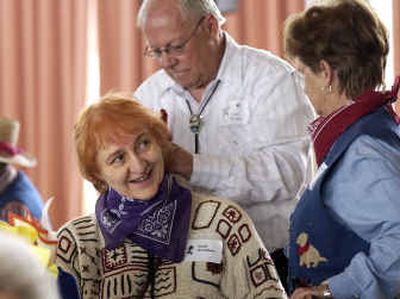Making Mother’s Day special

They gathered Sunday as they have for the past nine years, to be served dinner without having to do the dishes afterward, to receive a little gift, to be showered with attention.
The Volunteers of America sponsored the “I Remember Mama” luncheon in the Skyline Ballroom of the Red Lion Inn at the Park. About 100 women, who would otherwise be alone on Mother’s Day, were invited.
For whatever reason, their children could not be with these mothers, many of whom were single and of a certain age, though there were a few men scattered about at the tables, which were covered in white linen.
It was a Western-themed affair, and the guests wore bandannas that had been draped over the backs of their chairs.
All around them was the smell of food and the hum of conversation. They were hungry for both.
The VOA’s executive director, Marilee Roloff, said it is the volunteers who get the most out of the free annual event.
“The women that work on this have found this is the best Mother’s Day present to ourselves,” she said.
Irene deVilliers appreciated the VOA making “something special out of Mother’s Day.” Her sons are in Montana and Virginia with their own families now. The day can be lonely, particularly if you have not been in good health and do not have many friends.
Being able to talk to friends via the Internet is important to a woman as intelligent and articulate as she.
In fact, you could say deVilliers followed the information highway to Spokane. She raises rare Norwegian forest cats and struck up an online friendship with a woman here who shared her interest.
“It was fun to go somewhere where I knew someone,” said deVilliers, who settled in Spokane in 1998 after returning to the United States from her native South Africa where she had gone to care for her own mother.
Divorced and with her boys raised, she could not bear to take up residence yet again in inclement Oregon.
DeVilliers, now 56, was a young woman when she first left her native land. She had inherited her grandmother’s sense of right and wrong, a dangerous thing for a white woman in apartheid South Africa in 1969.
Her grandmother learned about the injustice of “separate development” on her small farm near Jamestown.
A Tswana tribal woman came to her in tears. The government was taking the woman’s baby away because the child was considered Xhosa, like his father who had deserted the woman.
DeVilliers adopted her grandmother’s anti-apartheid sentiments. In 1968, as a student at Rhodes University in Grahamtown, she helped her best friend, who was Afrikaner, flee the country. Her friend, Louise DeBruin, had been asked by the Nationalist Party government to inform on student activists at a time when “no” was not a reasonable response.
“So we got her out of the country, instead,” said deVilliers, who chose the same exit the following year.
“I also got married and didn’t want my children born into that kind of environment.”
Two minority white political parties ruled South Africa at the time. The mostly Afrikaner Nationalist Party came to power through gerrymandering, she said, and the mostly English United Party had no clue to the extent of the oppression. She blames this on censorship.
“We just didn’t know how bad it was,” she said. “We would not have put up with it otherwise.”
Today, apartheid no longer exists in South Africa, which saw its first democratic elections in 1994, but the country is still plagued by violence, poverty, unemployment and one of the world’s highest rates of AIDS infection.
Sunday’s was deVilliers’ second “I Remember Mama” luncheon. She was in good spirits during a respite from the chronic endocrine disease that sometimes leaves her an invalid. It was a good day to share her story and make some new friends.
If only the boys could have been there.